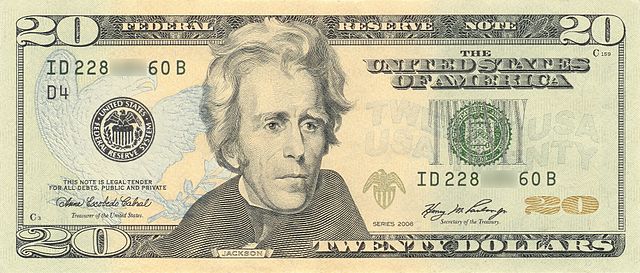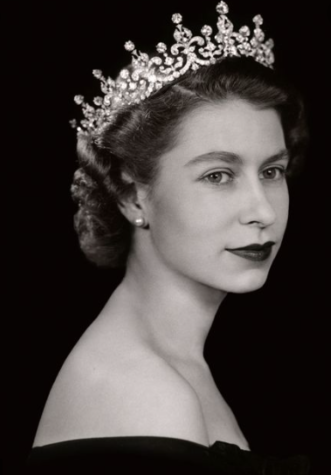A new face in an old place
Votes go on to change the face on the twenty dollar bill from Jackson’s to a woman’s
More stories from Alexis Moats
Come the year 2020, there may be a new face on the twenty dollar bill.
Instead of Andrew Jackson, you could possibly see Eleanor Roosevelt, Wilma Mankiller, Rosa Parks, or Harriet Tubman.
The campaign to have one of these women on the twenty dollar bill is called the Women on 20 or W20 for short. W20 was founded over a year ago. The goal to have one of these women on the twenty dollar bill in 2020 is to honor the 100th year anniversary of the ratification of the 19th amendment. The purpose of this group is to promote women’s rights.
The four women mentioned above were chosen through a series of votes. The voting process started with a list of a hundred American women. That list was narrowed down into sixty women by W20.
These sixty candidates were then surveyed based upon two criteria: their impact upon society and the level of difficulty to pursue their goals. Half of these candidates were eliminated; the other half were then presented to one hundred advisors who are experts in American and women’s history. The advisors then voted on fifteen women for the first public vote. They were: Alice Paul, Betty Friedan, Shirley Chisholm, Sojourner Truth, Rachel Carson, Rosa Parks, Barbara Jordan, Margaret Sanger, Patsy Mink, Clara Barton, Harriet Tubman, Frances Perkins, Susan B. Anthony, Eleanor Roosevelt and Elizabeth Cady Stanton.
In the first public round of voting, people were asked to pick three of the fifteen women. That vote ended on April fifth. From that vote Eleanor Roosevelt, Rosa Parks, and Harriet Tubman were the top votes. Wilma Mankiller was added to the final ballot due to complaints about a lack of Native American candidates. The final ballot is being held at this time.
The twenty dollar bill was chosen for two reason says the W20 website: despite all the good he did as President he did sign off on the Indian Removal Act (The Trail of Tears), and because of his opposition to paper money rather than gold or silver coins. Here are some key facts about each of the candidates.
- Eleanor Roosevelt
- Roosevelt was the first U.S. president’s wife to take, “…an activist role and present her causes directly to the people through her own press conferences, syndicated columns and radio broadcasts.”
- During World War I Roosevelt spoke at patriotic rallies and worked with the Red Cross, “…visiting wounded soldiers and working to improve conditions for the mentally ill.”
- Although she initially opposed women’s suffrage, she turned around and actively worked with the League of Women Voters after 1920.
- After the death of her husband, Roosevelt served as a delegate to the United Nations and, “…fought for the passage of the Universal Declaration of Human Rights.”
- Harriet Tubman
- Tubman, “…returned to the South an estimated 19 times” to lead slaves to freedom to the North via the Underground Railroad.
- During the Civil War, Union soldiers relied on Tubman, who served as a spy and scout, to, “…guide them when poorly drawn and outdated maps could not.”
- After the war, Tubman, “…advocated for education and property for freed slaves in the South and she cared for the elderly and poor.”
- After her death in 1913, she was nicknamed “General Tubman”, “…and laid to rest with military honors –- one of the first recorded African-American women to serve in the military.”
- Rosa Parks
- Parks became known as, “…the mother of the freedom movement” after refusing to move to the back of the bus for a white passenger in Montgomery, Alabama, in 1955.
- At the time of her arrest afterwards, she was the secretary for the Montgomery chapter of the NAACP and had, “…recently attended leadership training in workers’ rights and racial equality.”
- After her arrest, Parks worked for many years in Rep. John Conyers’ congressional office and also served on the board of Planned Parenthood of America.
- President Obama has said of her, “In a single moment, with the simplest of gestures, she helped change America and changed the world. … She takes her rightful place among those who shaped this nation’s course.”
- Wilma Mankiller
- Mankiller was the, “…first elected female chief of a Native nation in modern times.”
- She, “…advocated for extensive community development, self-help, education and healthcare programs that revitalized the Nation of 300,000 citizens.”
- Mankiller’s, “…family name refers to a traditional Cherokee rank.”
- She was awarded the Presidential Medal of Freedom in 1998, the highest honor given to civilians in the United States.
The final date for the vote has yet to be decided. To learn more about W20, or to vote and donate go to http://www.womenon20s.org/.









